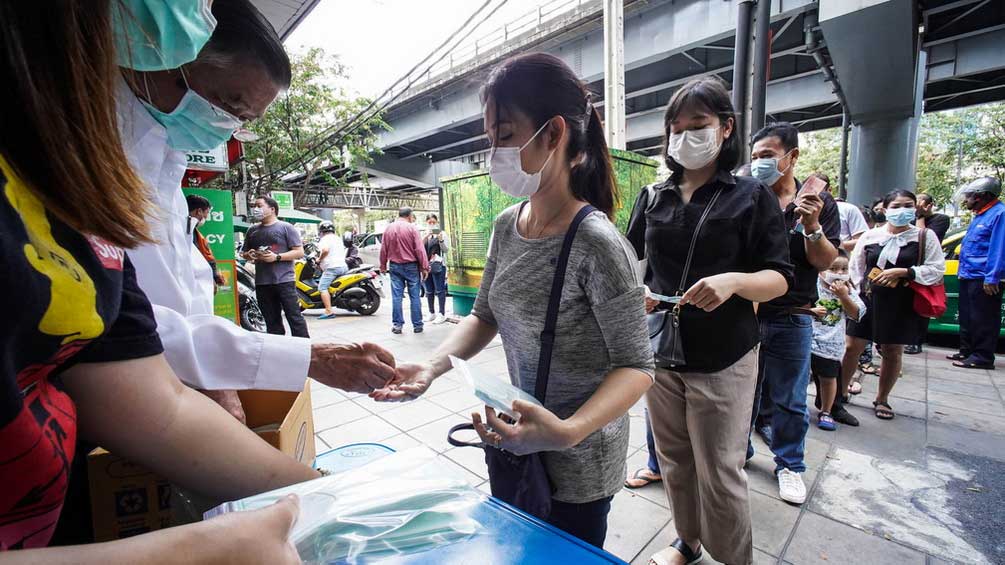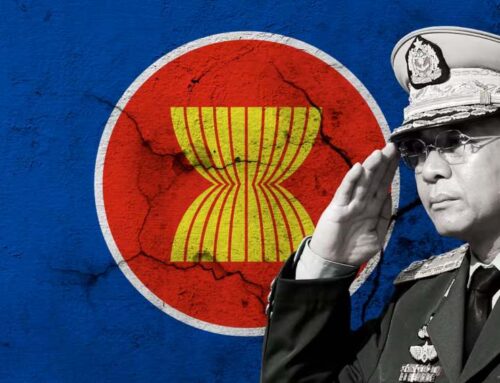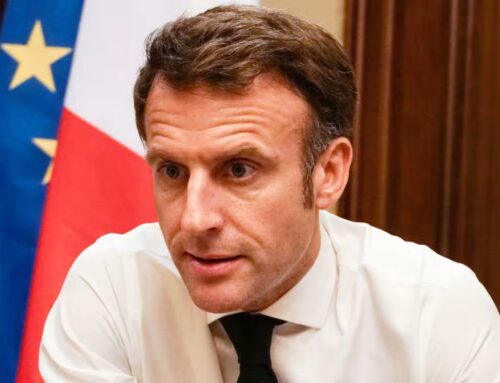Unexpected upsides to coronavirus
From greenhouse gases to saving endangered wildlife, improbable winners emerge{1st Photo Caption: People queue to buy face masks in Bangkok. (Photo by Akira Kodaka)}
TEA LEAVES
Unexpected upsides to coronavirus
From greenhouse gases to saving endangered wildlife, improbable winners emerge
GWEN ROBINSON
MARCH 18, 2020 09:30 JST
I live in Bangkok, which like other global cities, has been lurching between hysteria, official confusion and stoic pragmatism since the December outbreak of the novel coronavirus, or COVID-19.
Beyond the distressing accounts of rising infection rates, travel restrictions and job losses, daily life is being turned upside down. At a recent birthday party I attended, a friend caused near panic by putting candles on the cake. “No candles! No blowing!,” several guests shrieked.
Friends have also lost jobs, particularly in the hard-hit tourism and restaurant businesses. Others have been compelled to self-quarantine in hotels, leaving spouses and children at home, after visiting high-risk countries. Echoing more than 85 other countries, Thailand has just decided to close schools and universities until further notice. Worldwide, more than 776 million students are now off school, according to UNESCO, and teachers are frantically drawing up online curricula.
As drastic as school closures may be, they are high on my list of positive developments that could emerge from the coronavirus pandemic. Why? Because they are accelerating an education revolution that could democratize learning through digital schooling.
That can only benefit millions of children in poor or remote areas who cannot afford or access proper education — and pressure governments to improve internet access. Despite rhetoric about the “digital age,” the world has been slow to adopt distance learning. It’s time to turn the rhetoric into reality.
Amid global despair, other unexpected upsides to the virus crisis include:
A significant reduction in greenhouse gas emissions and air pollution We have already seen a sharp drop in emissions due to factory closures in China and around the world, decreased coal burning, and the collapse of air travel. The downside has been temporary job losses and corporate agony. Emission levels tend to bounce back after global disruptions. But the powerful demonstration of the benefits of a clean environment could lead to some lasting changes in attitudes and industrial policies.
Fewer international conferences and junkets, and more teleconferencing The disruption to travel has been devastating for hotels, airlines and support industries but the rise of video-conferencing and associated apps is a welcome check on the torrent of overhyped international events, and further reduces the environmental impact of travel.
A potentially lethal blow to illicit wildlife trade, including stronger enforcement China’s recent comprehensive bans on wildlife trade and consumption underscored fears that the coronavirus originated from trafficked animals in the fresh food markets of Wuhan. Wildlife campaigners have hailed these actions as crucial in stopping the illegal smuggling of hundreds of species, from tigers to pangolins. While China already had weakly enforced laws on wildlife trading, the latest moves are likely to be more effective due to popular fears of infection.
Curbing “overtourism” and related environmental destruction From Asia to Europe, countries have seen the degradation of natural beauty spots due to huge increases in mass tourism and the thoughtless construction of support facilities. With sweeping travel restrictions, there will be time for regeneration. Of course the tourism industry will need urgent help from governments and investors. But policymakers will also need to adopt a more responsible approach to tourism.
The rise of new corporate stars Amid market turbulence and the plunge in share prices of big oil, airline and other industries, some winners have emerged. I’m not just talking about makers of toilet paper, hand sanitizers, face masks and rubber gloves. Zoom Video Communications, the remote conferencing services company, has seen its share price rise sharply, while TV streaming, online shopping and delivery services are solidifying their market position as more people are forced to stay at home.
The unmasking of inadequate public health systems and indecisive governments Critics have savaged the bombast and prevarication of leaders, from the U.S. and U.K. to Thailand, as they struggle to respond to the virus crisis. Knee-jerk actions over virus testing procedures and travel bans have exposed official incompetence and unleashed new pressure for reform — even in authoritarian China.
A grim “rehearsal” for worse to come The coronavirus pandemic might eventually be seen as an unwanted but invaluable wake-up call and practice run to tackle more lethal pandemics in future. As the earth’s permafrost melts, scientists have warned that long-dormant bacteria might inflict new and uncontrollable viruses.
A better, more mindful world The pandemic is forcing radical changes in lifestyles for almost everybody. Will people learn to embrace telecommuting, online learning and the joys of staying at home rather than jetting off for holidays? Will it generate a sense of empathy? The sight of supermarket punch-ups over toilet paper and face masks makes one wonder. A sense of panic has led to ugly xenophobic responses. But it has also produced rare unity, amid the inescapable realization that we are all in this together.
Gwen Robinson is editor-at-large of the Nikkei Asian Review.
Source Link: NIKKEI ASIAN REVIEW





